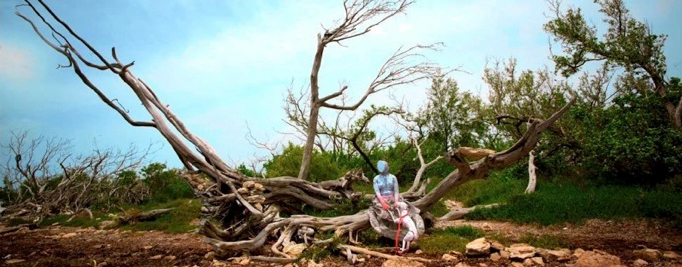
An interview with artist Juan Carlos Zaldívar
I stole some of these questions from Juan Carlos Zaldívar’s project, “Shifting Nature,” in which Zaldívar questions the ever-changing nature of being human. We are in constant motion, constant transformation, even when we don’t feel like we’re doing anything. Oh, and we die to release love…
Neil de la Flor: Who really are you—filmmaker, video artist, magician?
Juan Carlos Zaldívar: I have an MFA from NYU’s film school. My attraction to film has always been that it is the youngest of the art forms and therefore one that is constantly evolving. My work always pushed the boundary of whatever genre it found itself in. Come to think of it, my work is often between genres. I am not a magician, but my grandfather used to disappear pennies and make them appear in all sorts of odd places around the neighborhood. I loved that.
ND: Tell us about your project, “Shifting Nature.”
JCZ: “Shifting Nature” is an ongoing project. The newest iteration will be part of the Here & Now Festival at the Miami Light Box at Goldman Warehouse in May 2014.
ND: How was it divined, conceived and processed?
JCZ: “Shifting Nature” really started back in 1998 when I went through the Sundance writer’s lab with a story about a superhero whose powers come to full force when he is dressed as a woman. I re-wrote that script so many times and always got great responses from everyone, but I never got the money to actually produce it. Over the years, my idea turned into an obsession and I came to realize that it is because the core themes of that story make my creative thrust as an artist, so I began to produce various incarnations of it however I could. Along the way, the term transmedia came along, and I have been really involved in exploring the intersection between film, technology and the visual arts. There are still no “transmedia” projects about transgender people, which I find ironic. I guess technologies can now go trans but people still can’t, so I have not given up. My friends keep telling me that it took 15 years to make “Frida.”
ND: What do lightning, history and memory have in common?
JCZ: They are all misunderstood. We make assumptions about them and find them too unsettling to think about. For instance: We still don’t know what causes lightning, though it strikes the surface of the earth over 8.5 million times a day. We still argue about whose history is the right one. Our brain is not linear, but we insist in believing that memories are only a thing of our past.
ND: Is it important how others see you and your work?
JCZ: No. It is important for me to question my assumptions as often as possible. It keeps me active, and it makes me feel alive. Other people’s point of view can be useful in doing this.
ND: Why do you create?
JCZ: Because I think philosophers and scientists got it wrong. We are really “human doings,” not “human beings.”
ND: I love that quote! Who/what are some of your major influences?
JCZ: The most moving performance I have ever seen was by the Butoh dance company, Sankai Juku. In philosophy, my pivotal discovery was existentialism. In literature, it included the transcendentalists and the surrealists. In film, Fritz Lang, F. W. Murnau, Ingmar Bergman and Czech science fiction films from the ’70s. In contemporary video, Bill Viola, Eija-Liisa Ahtila and Pipilotti Rist. I aspire to make an underwater love story inspired by turn of the century Russian sci-fi novels in the next couple of years—even if I have to use paper cutouts to do so!
ND: One of my favorite lines is from the classic children’s story, The Velveteen Rabbit: “’Real isn’t how you are made,’ said the Skin Horse. ‘It’s a thing that happens to you. When a child loves you for a long, long time, not just to play with, but REALLY loves you, then you become Real.'” What makes you (or your work) real? Take this any direction you’d like…
JCZ: Love is another story. Perhaps “Shifting Nature” is my search for love. Who knows? I recently read Lori Anderson’s open letter after the death of Lou Reed, to whom she was married to for 21 years. In her letter she believed that the purpose of death is the release of love. Sometimes I share the sentiment that all we do in life is attempt to conquer the impossible in a million ways. Then again, isn’t that a valiant effort? (Maybe that is why we love super heroes.)
ND: Favorite meal?
JCZ: Chickpeas (garbanzo beans) by any other name, in any shape, way or form. Trans-chickpeas.
Juan Carlos Zaldívar is a Cuba-born filmmaker who lives and works in the United States. He completed both his BFA and a Masters of Fine Arts at New York University’s Tisch School of the Arts, where he has also taught as an adjunct faculty member. His film and video art works have screened at many festivals worldwide and broadcast on PBS, ABC, IFC, Showtime and WE. He is the recipient of numerous grants and awards. His directing credits include “90 Miles” (PBS), “The Story of the Red Rose” (Showtime), “Palingenesis” and “Soldiers Pay” (IFC); and he has co-directed with David O. Russell (“Three Kings,” “The Fighter”) and Tricia Regan (“Autism,” the musical). He has served as a juror for several major film festivals including the Sundance International Film Festival. He is a Sundance Film Institute alumnus. He currently teaches at Miami International University’s Art Institute and has co-founded the Miami Filmmakers Collective with a Knight Arts Challenge grant from the John S. and James L. Knight Foundation, with a matching grant from the Miami-Dade County Department of Cultural Affairs.
Recent Content
-
Artsarticle ·
-
Artsarticle ·
-
Artsarticle ·
